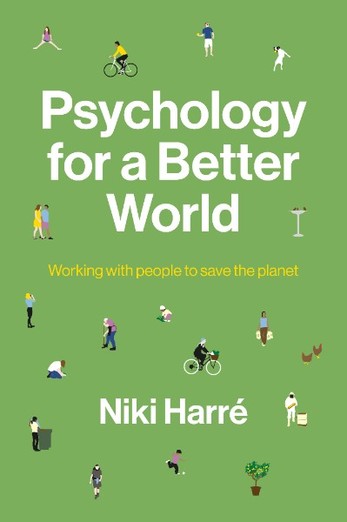
by Niki Harré
With only a lay-person’s knowledge of psychology, at least at the academic level, I open the book with some misgivings. The subtitle, though, encourages me, especially as I know Niki Harré has done much to champion the environment. And right at the beginning I’m assured that the book is indeed for people like me –
“…contains numerous strategies for making (more) sustainable practices and policies… for the teacher…the office manager…the student…the politician…the builder…the mother…Whatever your social location, if you believe a more sustainable world is possible, then this book is intended for you.”
It’s edition 2 of this title, being an updated look at a book first published in 2011. It’s a chastening thought that as little as seven years can make a deal of difference.
The text is ordered into five chapters –
Positive Emotions and Flow: Encouraging Creativity and Commitment; Copying: The Power of Doing and Telling; Identity: The Role Of Who We Are and Where We Belong; Morality and Cooperation: Making the Most Out of Our Desire to Be Good; A Self-Help Guide for Sustainability Advocates.
The examples of case studies discussed in the chapter on positive and negative emotions are really interesting and, from them, conclusions can be made about how each mode can have its place in motivating people to act for the benefit of the environment.
Further examples in chapter 2 illustrate the human habit of copying behaviour, leading to the conclusion that “modelling is a very powerful means to learn current practices and to transmit new ones.” This includes the telling of stories, not only more formally but as gossip – an activity that can be used to very good effect in setting models of sustainable behaviour.
Chapter 3 changes the focus from the individual to groups, as the author considers where we stand as members of communities – local, national, international, or ideologically based, and how this affects our attitudes and behaviours. Again, we need to assess our relationship to the whole. I’m left wondering whether to sell my car and buy a bicycle.
As interesting as the preceding chapters are, I find the 4th, on morality and consideration, even more so for its examination of the basis of ethics.
The short concluding chapter looks at what can be done at personal, group, and civic levels.
Written by an academic for general readership, Psychology for a Better World is well researched, very readable and accessible. At the end of each chapter there’s a list of key suggestions to help bring about change.
This short summary can’t do justice to the content nor to its worth to those interested in improving their knowledge of the social aspects of attitudes to sustainability.
Author: Niki Harré
Publisher: Auckland University Press
ISBN: 9781869408855
RRP: $29.99
Available: bookshops

 RSS Feed
RSS Feed
